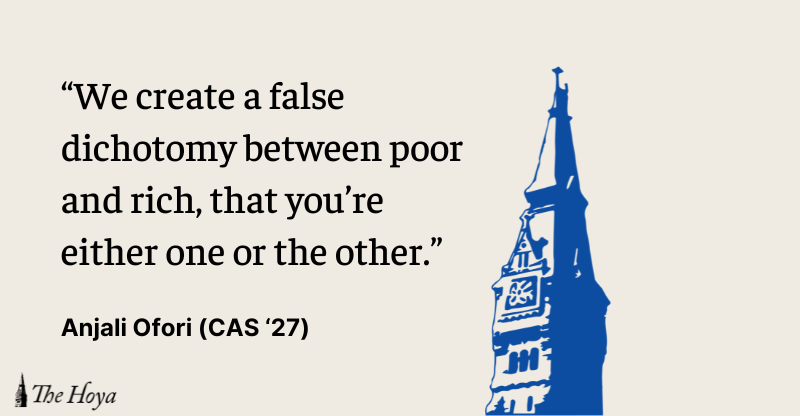
When I first arrived at Georgetown University last year, it felt like everyone couldn’t stop talking about how different Washington, D.C., was from their hometowns — the humid, muggy weather or annoying mosquitoes were all anyone talked about.
Having grown up in Maryland, just half an hour away from here, these conditions were nothing new to me. Nonetheless, I experienced a different kind of culture shock: I didn’t realize the sheer amount of wealth flaunted by my fellow students. I knew what I was signing up for when I committed to an elite, private and predominantly white institution, but the class differences were hard to conceptualize until it was right in front of me every day. Many students wore designer items — Golden Goose and Alexander McQueen sneakers instead of Nike Air Forces, Louis Vuitton and Goyard purses instead of JanSport backpacks, and Canada Goose coats over one from Burlington Coat Factory. These differences in material possessions sometimes made me feel like an outsider as I struggled in adapting to my new environment.
In a weird sort of retaliation, I felt the inexplicable need to drop my own subtle status signals to communicate my class, or to differentiate myself from “the elites” or “one-percenters.” I would casually mention that I went to a Title I public school or paid for my car through hard-earned money to convince others, and maybe even myself, that I was not like a “typical” Georgetown student. It’s not just me though — I’ve often heard other students nonchalantly mention their work-study status or lack of parental allowance to subtly distinguish themselves from their more affluent peers.
In doing so, we transform our lack of economic advantages into social currency, a futile attempt to elevate ourselves through our disadvantages. It establishes a false narrative that affluent students should be ashamed because they somehow used money to their advantage, and less-affluent students should be celebrated for overcoming structural obstacles through hard work and determination. We inadvertently reinforce a class hierarchy, all because we want to avoid being at the bottom of a social ladder we are scared will turn against us.
I want to acknowledge that our different financial backgrounds profoundly shape our daily experiences. It’s alienating when you can’t go out with friends because a restaurant is too expensive or feel pressure to overachieve because you don’t have a financial safety net. Money is an uncomfortable topic, and this discomfort must be overcome to create real understanding and inclusion across Georgetown. How people share their experiences, through these mindless status signals — therein lies the problem.
By subtly dropping these social status symbols, we fail to acknowledge that attending Georgetown is a privilege in and of itself. We have the time, money and capacity to attend a prestigious university, an opportunity that only some people can take advantage of. While we all come from different backgrounds and have had to make sacrifices, at the end of the day, we are at Georgetown to (hopefully) elevate our social status and income-earning opportunities. We are studying and establishing a network to become successful. I chose Georgetown over my state school because I knew it would, ultimately, put me further ahead.
Through these subtle indications, we also create a false perception of what it means to be “poor.” We distort the reality of poverty — and its adjacent consequences that tens of millions endure — just to ease our own consciences about attending an elite university built on wealth and privilege. Yes, I may have gone to a Title 1 public school, but it was also in one of the richest counties in the country. And while I did pay for my own car, my parents are paying for my education. We create a false dichotomy between poor and rich, that you’re either one or the other. In reality, most people straddle the in-between.
I implore you to think about why you feel the need to mention how expensive your flight home was or that you bought something on sale. Do we want to influence how others perceive us, or are we using these conversational status signals to convince ourselves that we are down-to-earth to avoid confronting the fact that we now go to a wealthy school that will have highly beneficial outcomes for our careers?
Anjali Ofori is a sophomore in the College of Arts & Sciences.